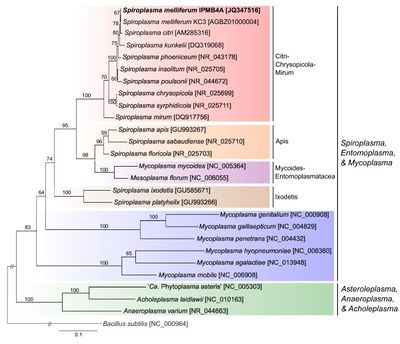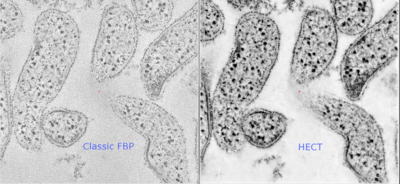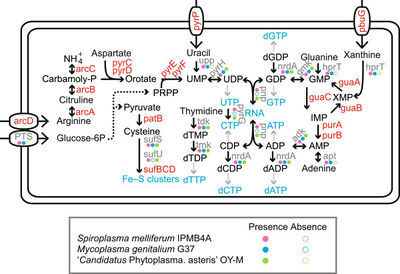Spiroplasma melliferum: Difference between revisions
From MicrobeWiki, the student-edited microbiology resource
| Line 58: | Line 58: | ||
While most of the <I>Spiroplasma</I> species appeared to be harmless commensals of insects, a small number of species have evolved pathogenicity toward various arthropods and plants | While most of the <I>Spiroplasma</I> species appeared to be harmless commensals of insects, a small number of species have evolved pathogenicity toward various arthropods and plants (1). | ||
Host: infects the honeybee. | Host: infects the honeybee. | ||
==References== | ==References== | ||
Revision as of 16:57, 11 January 2014
A Microbial Biorealm page on Spiroplasma melliferum
Classification
Higher Order Taxa:
Class: Mollicutes
Order: Mycoplasmatales
Family: Spiroplasmataceae
Genus: Spiroplasma
Species: melliferum
NCBI Accession #: JQ347516
Description and Significance
Genome Structure
The whole-genome shotgun sequencing of S. Melliferum IPMB4A produced a draft assembly that was ~1.1 Mb in size and covered ~80% of the chromosome (1).
Cell and Colony Structure
Spiroplasma melliferum is a helical, motile bacteria without cell walls (1). Spiroplasma melliferum has a classic fried-egg shaped colony morphology.
Metabolism
Ecology
Endosymbiotic inhabitants.
Pathology
While most of the Spiroplasma species appeared to be harmless commensals of insects, a small number of species have evolved pathogenicity toward various arthropods and plants (1).
Host: infects the honeybee.



